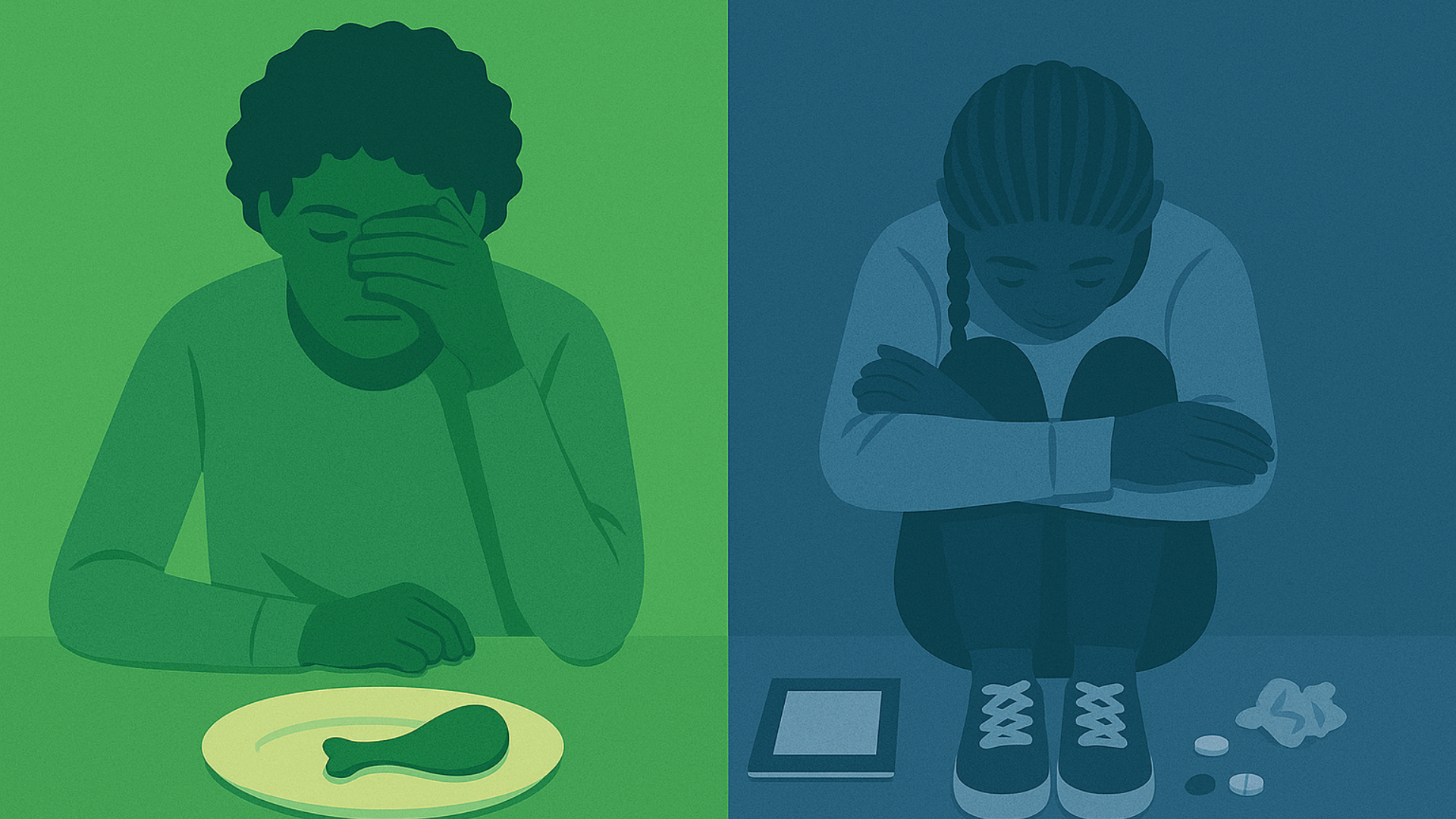Tips and Tricks for Adjusting to New Parenthood: Your Therapist’s Expectations vs. Your Reality as a New Parent

By Amanda Boe, PMAD Program Clinical Lead and Therapist at Thrive
THE STRUGGLE IS REAL
Just get through the day. This has been a mantra that I’ve held on to quite tightly throughout my pregnancy and post-partum. My daughter is six months old and after experiencing three miscarriages prior to her, the only thing I was focused on was staying pregnant. So much so that I didn’t “nest” much or prepare my heart at all for the changes that were going to occur.
Most of the time I feel like I’m stumbling through the day. Well actually, I quite literally am stumbling like a drunk because I’ve had maybe 45 minutes of sleep (while my husband rested peacefully) and my body and circulation have changed! (Nobody told me that). With my feet throbbing on pins and needles, I rock and carry my baby who only wants me to hold her or stay within her line of sight. This is how we finish laundry, emails and this blog. Honestly more times than I’d like to admit, I have bumped my daughter’s head on our washer as I’m leaning in to transfer clothes.
This is it. This is motherhood. I question every single move I make. I wonder if people think I look awkward with my daughter. People call me a professional because I work with children, parents, and their RELATIONSHIPS, but honestly, I barely have a clue what I’m doing with my own. I wonder what my daughter thinks of me — poor thing may think it’s normal for mamas to have to look up everything on the internet before we try a new food.
I’ve often relied on my own mother, coworkers and mama friends to provide me with validation and insight while navigating motherhood. But when I text that mama friend about seeing things on the internet and asking her opinion, she kindly laughs it off and reminds me we are all struggling. That’s the input I need — I need to know I’m not the only one. Through this blog, I hope to shine a light on how the ethereal expectations of motherhood differ from the messy reality.
With this goal in mind, I asked some of my most valued mama friends who are also my coworkers to help normalize motherhood struggles and their responses were GOLD.
I’ll go first.
ADVICE FROM AMANDA
Amanda Boe, PMAD Program Clinical Lead and Therapist at Thrive
The struggle: Adjusting to balancing work and motherhood
- My advice as a therapist: It’s important to recognize that your identity can be in both your career and motherhood. Fostering and finding your sense of self is important while your systems change. My hope is that my relationship with myself is benefited by holding both roles.
- My experience as a parent: It’s not balancing. It’s holding so many things at once and if you drop one thing, you drop it all. But also don’t offer to take something off my plate because I don’t want to miss anything. The real balance is between FOMO and mom guilt.

ADVICE FROM ANN
Ann Edinton, LCSW, Therapist at Thrive
Here’s what my colleague, fellow mama, and friend, Ann Edgington, LCSW, had to say about parenting expectations vs. reality —
The struggle: Waking up throughout the night and the resulting sleep deprivation
- My advice as a therapist: Sleeping through the night is a developmental milestone similar to walking and talking. There are things you can do to help your child along, but ultimately they’re going to reach those milestones on their own, regardless of what you do. The part of their life when they are waking multiple times per night is very short in the whole picture of their life and certainly in the picture of their life in your care. Surround yourself with help. This can include support from family and friends, a night doula, or even a sleep consultant if that fits your style. Know that this too shall pass, and 3 a.m. is a great time to remember there are millions of others like you up at the exact same time for the exact same reason.
- My experience as a parent: Sleep when the baby sleeps, and clean when the baby cleans, amiright ? There’s the physical exhaustion of sleep deprivation but then there’s the exhaustion of just general parenthood (and parenthood in a pandemic and parenthood in America), which is next level and goes beyond just being sleepy. My kid’s morning smiles seem to wipe that out until the next night at 3 a.m. What a rollercoaster.
The struggle: Baby and toddler meltdowns
- My advice as a therapist: Humans are not born with coping skills or emotional or verbal processing skills, and all of these skills are vital to navigating conflict in our world. It’s our job as adults to take care of ourselves so that we can remain regulated enough to help our little ones through upsets and meltdowns. It’s so important to curate your environment so that you have the support you need to keep calm as you make your way through the meltdowns.
- My experience as a parent: All of the stuff you thought you had such a great handle on before the baby will come for you in the night, and the day, and several moments in between. You will have moments when you need to go sit in the room on the other side of the house so that you don’t hear your toddler screaming bloody murder because your partner is (God forbid) trying to wash the yogurt out of his hair in the bath. It’s not about eliminating those moments altogether, but continuing to put one foot in front of the other when those moments happen and knowing that it is not humanly possible for them to scream forever…right?
The struggle: Stressful mealtimes and feeding issues
- My advice as a therapist : It’s your job as the parent to decide when meal and snack times happen and what is on the menu; it is your child’s job to decide what to eat and how much of it. There are wonderful, evidence-based, and nonjudgemental resources in our community and online regarding lactation support, reflux, baby-led weaning, food allergies, and picky eating — among other feeding topics. It is developmentally typical for children to experience pickiness as they begin to differentiate themselves from others.
- My experience as a parent: Some of the best food advice I got was from my dad. He said, “Babies and dogs are similar in that they’ll eat when they’re hungry and they’ll poop when they’re full.” Except he didn’t say poop. The wisdom of our elders…
The struggle: Intimacy during postpartum
- My advice as a therapist : Once the baby is born you are not going to have the time or energy to stay up late and hash out money, sex, and communication conflicts like you did pre-baby. So take the time before the baby comes to talk about how you talk about these things, that way, you have a common language to fall back on once you need to. Read Come As You Are together. Consider couples counseling, before or after the baby. Consider pelvic floor physical therapy and/or individual mental health support as you relearn what your body needs and is comfortable with postpartum. It is so important that your partner understands that comfort with intimacy postpartum is so much more than that six-week clearance from your provider.
- My experience as a parent: Everyone told me, “Oh your relationship will change so much after the baby.” And I thought, — Nope not us. We’re bffs forever no matter what. HA. I really feel like the adrenaline of childbirth didn’t wear off until like six months postpartum, so intimacy at first felt fun because I still felt just as close to my dood then as I did when I was pregnant…and then it felt like the bottom fell out and I was a stranger in my own body. Pelvic floor physical therapy was LIFE CHANGING for so many reasons; intimacy was just one thing on that list. It helped me find my way back to myself, which was something I was not prepared to need to do. And now every Beyonce and Dolly Parton lady ballad hits even harder than it did before.
The struggle: Going back to work
- My advice as a therapist : Going back to work can trigger intense and confusing feelings, which are all normal. Explore with your employer what supports or accommodations might be available to you as you make this adjustment. For example, with regard to scheduling, chest feeding if that applies to you, or sick leave when needed. Talk with your partner or co-parenting caregivers about how the division of labor might change at home related to getting out the door in the morning and prepping for the next day in the evening. Seek mental health support to process how you’re feeling about going back.
- My experience as a parent: Death to the martyr mom narrative! Reject the narrative that you should feel guilt or, dare I say, that you should miss your babies 100 percent of the time when you’re not with them. NO. It’s healthy to separate yourself. It allows you to recharge yourself and be the kind of parent you know you want to be when you come back to them, and it widens the circle of people who love and care for them, which benefits you both. Trust your gut; when it’s time to fill your individual cup you will know, just like your parent gut tells you when it’s time to hug your babes close.

ADVICE FROM ANDREA
Andrea Thompson, APRN, FNP-C, PMHNP-BC, Psychiatric Nurse Practitioner at Thrive
The struggle: Waking up throughout the night and the resulting sleep deprivation
- My advice as a nurse : It is extremely important to discuss with your partner, support system and healthcare team how you can feasibly care for your baby and also get adequate rest. Inadequate sleep can be an exacerbating factor that may significantly influence your mental health which makes this topic even more important. Have these discussions prior to delivery, get a game plan, and then be flexible with your plan to ensure that you and your family can get much-needed rest. Some strategies may be to involve your partner in midnight feedings by getting you snacks/water, taking turns with feedings whenever possible, and being sure to discuss with your healthcare provider any barriers that may arise such as anxiety, infant feeding concerns, and safe sleeping practices with your infant.
- My experience as a parent: There may be times that you look across the room when you are up at 3 a.m. feeding your baby, stare at your partner and think, why do men even have nipples? Useless breasts! Some days you may not even know how you are functioning on such little sleep. (I have been through college several times and I can tell you that those ‘all nighters’ were nothing!) But with the right support, and the right mom friend to text at 3 a.m. who will allow you to laugh at the moments like when you realize you have forgotten to change your shirt for three days, you will get through this; it’s temporary. And that shirt is FASHION.
The struggle: Baby and toddler meltdowns
- My advice as a nurse : It is normal for babies and toddlers to respond in ways that can be difficult for their parents and caregivers to navigate. As their brain is developing rapidly and they are learning the world at a fast pace, the result can often be what we perceive as meltdowns as they learn to communicate how they feel. It is best to respond with patience and to validate their feelings. If you do have concerns regarding your children’s temperament or development, it is always a good idea to discuss with their pediatrician. They can also discuss safety precautions with you, especially when it comes to your infant/baby response.
- My experience as a parent: Oh for heaven’s sake, it’ll always happen in the middle of the park, in front of every other mom and it will most certainly be over the snacks you brought that were WRONG. Or if you are lucky, it will even include more than one of your children bickering with each other over the one and only stuffy we own, amiright ? Sometimes you just gotta ignore it, walk away and say out loud, whose kids are those!? If you vow to give the Hunger Games whistle and hand signal to any other mom going through the same thing, we all gonna be alright.
The struggle: Always feeling needed by your child and never having any alone time
- My advice as a nurse : It can be incredibly suffocating to always feel needed and/or ‘touched-out’ by our children and family. It can feel chaotic just to get through your daily routines and often moms feel as though they have little to no time for themselves. It’s important to prioritize time for yourself even if just for a short walk. It’s also important to be able to recognize if we need more assistance trying to process our feelings and emotions surrounding this topic. Tools for this could include attending a local moms’ group or perhaps considering individual or couples therapy to learn how to better communicate your needs.
- My experience as a parent: Ever hide in the bathroom? Does that count as meditation?
The struggle: Intimacy during postpartum
- My advice as a nurse : It can be intimidating to consider being intimate post-delivery, no matter who you deliver. It is also important to consider your future family planning and discuss with your care provider what your plans may be to prevent pregnancy if you so choose. It is not normal to feel pain while being intimate so be sure to discuss any concerns with your healthcare provider.
- My experience as a parent: That’s gonna be a no from me…
The struggle: Going back to work
- My advice as a nurse : Some birthing people can feel anxious to return to work while others may feel guilty that they are eager to flee the nest. Whatever your feelings surrounding this may be, be sure to talk with your care provider about how they can help you with your mental health. It’s also important to plan ahead if you can talk with your employer about how they can make this transition more seamless and to your partner/support system on how they will be able to help as well.
- My experience as a parent: I used to joke, when you get pregnant, you tell your partner, and then your child care provider. The list is LONG. I don’t like to think of the term balance there. It implies I am always trying not to fall. Each time I have returned to work postpartum, I have felt like I may fall on my face. I have cried in cars while I pumped and I have also gleefully dropped off my kiddo to head to work…what a roller coaster. I’ll save you a seat.
About the Authors
AMANDA BOE — PMAD Program Clinical Lead and Therapist
Amanda Boe earned her master’s degree in counseling from the University of Nevada, Reno. She has over nine years of experience working with children, individuals and families who have experienced trauma. Her experience also includes working with clients who live with perinatal mood disorders, anxiety, and depression. Amanda is passionate about healing relationships among families and unresolved trauma using evidence-based practices. She is certified in Child Parent Psychotherapy. Amanda offers individual, couples, and family therapy.
ANN EDGINGTON, LCSW — Therapist
Ann Edgington, LCSW, is originally from Chicago, Illinois and received her master’s degree in social work from Loyola University Chicago. Ann has been working with children, families, and adults who have experienced trauma for eight years. She found her way to infant and early childhood mental health treatment through her previous experience as a health educator, child welfare case manager, and clinical social worker in middle and high schools. She is currently completing training to become certified in Child-Parent Psychotherapy (CPP) as well as a certification in perinatal mental health (PMH-C). Ann is passionate about working with adults and children to process life experiences, explore how trauma lives in the body, and heal relationships through attachment-focused and evidence-based practices. In her free time, Ann enjoys cooking, baking, and hiking.
ANDREA THOMPSON, APRN — Perinatal Mental Health Nurse Practitioner
Andrea Thompson, APRN is a Nurse Practitioner whose background has stemmed in primary care, primarily working with under-served and under-insured populations. In early 2019, she started a program the first of its kind in Northern Nevada to integrate mental health services into a women’s health/OBGYN practice where she had a focus on perinatal mood and anxiety disorder diagnosis and treatment. She has completed certificate training with Postpartum Support International and is near complete with her Postmasters Certification as a Psychiatric Mental Health Nurse Practitioner. As a postpartum depression survivor herself, she has a passion for helping other women throughout their journey to mental wellness. She and her husband moved to the Reno area several years ago from Seattle, WA to settle into a place to raise their family; they have two young boys. Aside from spending time with her family outdoors, Andrea is also active in the efforts to improve the sexual health education offered to the youth in our community as well as advocating at the state level to support Nurse Practitioner autonomy and Maternal Mental Health.








